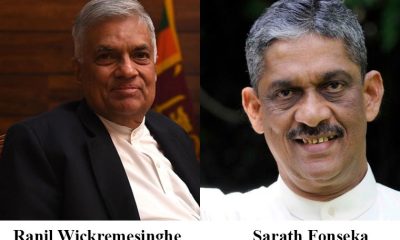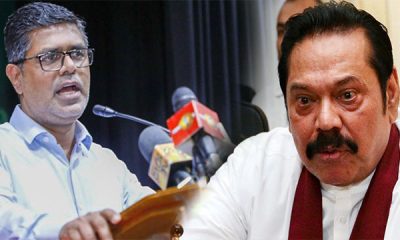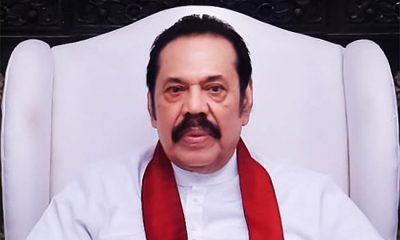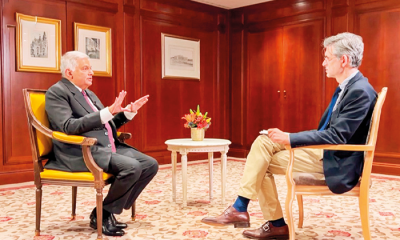News
MR asks Ranil to suspend privatisation projects

SLPP leader Mahinda Rajapaksa, MP, has asked President Ranil Wickremesinghe to suspend ongoing privatisation projects, pending the conclusion of the presidential polls scheduled for Sept/Oct this year.
Former President Rajapaksa has said in a media statement: “The present government is an interim arrangement formed to run the country for the remainder of former President Gotabaya Rajapaksa’s term. Even the pro-privatisation lobby should realise that the hasty divestiture of state-owned assets at a time like this will not produce the best outcome for the country. Furthermore, the next Presidential Election is only a few months away.
Hence, as a measure to ease the widespread discontent over the government’s divestiture drive, I wish to propose that all moves to sell off stateowned assets or enterprises be postponed until a new government is formed after the next Presidential Election. The new government will then be able to deal with state-owned properties and enterprises in accordance with the mandate they obtain at the election.”
Full text of the statement:
“The government’s plans to sell off certain national assets and state owned enterprises have given rise to discontent among trade unions, political parties and the general public. The present divestiture drive is ostensibly aimed at minimizing govt. expenditure on loss-making state-owned enterprises and meeting certain IMF conditions in that regard. I ruled the country for more than nine years, from November 2005 to January 2015, without ever selling a single state-owned enterprise. In fact, my government actually re-acquired some state-owned enterprises, such as the Insurance Corporation, and Lanka Hospitals, that had been sold off by previous governments, and these enterprises continue to make profits for the state to date.
My government had a pragmatic approach towards state-owned assets and enterprises. If a state-owned enterprise was making profits and providing a good service to the public, we saw no reason to privatize it. At times, a government may take a strategic decision to manage the prices of certain goods or services produced by state-owned enterprises for the overall benefit of the economy or to help low-income earners. The energy sector is a good example of this. There is no government in the world that does not subsidise certain earmarked economic activities.
During my tenure as President, even if some state-owned enterprises made losses due to a government decision to manage prices, our management of the economy resulted in an unbroken nine-year economic boom. We had no difficulty in paying off our debts or meeting the costs of the subsidies we maintained and nobody even spoke of privatisation when I was President. Since the divestiture of certain sectors can have far reaching consequences for the country, especially when foreign parties are involved, this is an issue that has to be approached with caution.
As was resolved at the SLPP May Day rally, any restructuring of state-owned enterprises should take place with maximum transparency, according to a national plan, in a manner consistent with national security and in consultation with the employees.
Having said that, I wish to stress that the trade union sector, for its part, should take a more nuanced approach towards private sector participation in state-owned enterprises. Going by the dictionary definition of privatisation, any involvement of the private sector in the ownership structure or the control of a state-owned asset or enterprise can be characterized as privatisation. However, trade unions should not oppose every attempt to obtain foreign or private sector investment in a government owned enterprise. A pragmatic and non-dogmatic approach to such matters is required.
If there are unutilized government properties or underperforming government enterprises, it makes sense to obtain private sector participation to turn such enterprises around. If a profitable state-owned enterprise needs further investment to add a new feature which cannot be financed by the government, it makes sense to award a share of that enterprise to a private investor in exchange for the investment. If an investor is willing to build a new enterprise from scratch, it makes sense to award shares in that enterprise to the investor so that a new state asset comes into being.
Some political parties have an ideology driven, dogmatic approach to privatization and seeks to privatize anything and everything that can be privatized. Many trade unions also have a similarly dogmatic attitude and tend to oppose any involvement of the private sector in state-owned enterprises. Both these extremes are harmful to the country. Trade unions should regard proposals to obtain private or foreign participation in a state-owned enterprise on a case by case basis and look at the overall benefit of such collaboration to the country.
The only real way national assets and strategically important state-owned enterprises can be safeguarded is by having a government that takes a pragmatic and non-dogmatic approach to such matters. This is why it is important to take note of the fact that when I ruled the country for more than nine years, the economy flourished and there was not even a discussion on the subject of privatisation.”
Latest News
Bell 212 helicopter crashes into Maduru Oya reservoir

It has been reported that a Sri Lanka Air Force Bell 212 Helicopter has crashed into the Maduru Oya Reservoir this morning.
Latest News
Heat index is likely to increase up to ‘Caution level’ at some places in Northern, North-central and Eastern provinces and Monaragala and Hambantota districts

Warm Weather Advisory
Issued by the Natural Hazards Early Warning Centre of the Department of Meteorology at 4.00 p.m. 08 May 2025, valid for 09 May 2025
The public are warned that the Heat index, the temperature felt on human body is likely to increase up to ‘Caution level’ at some places in Northern, North-central and Eastern provinces and Monaragala and Hambantota districts.
The Heat Index Forecast is calculated by using relative humidity and maximum temperature and this is the condition that is felt on your body. This is not the forecast of maximum temperature. It is generated by the Department of Meteorology for the next day period and prepared by using global numerical weather prediction model data.

Effect of the heat index on human body is mentioned in the above table and it is prepared on the advice of the Ministry of Health and Indigenous Medical Services.
ACTION REQUIRED
Job sites: Stay hydrated and takes breaks in the shade as often as possible.
Indoors: Check up on the elderly and the sick.
Vehicles: Never leave children unattended.
Outdoors: Limit strenuous outdoor activities, find shade and stay hydrated.
Dress: Wear lightweight and white or light-colored clothing.
Note:
In addition, please refer to advisories issued by the Disaster Preparedness & Response Division, Ministry of Health in this regard as well. For further clarifications please contact 011-7446491.
News
EC asks winners to name heads of majority-controlled LG institutions; bargaining continues in hung councils

Chairman of the Election (EC) Commission R. M. A. L. Ratnayake said yesterday that the EC would direct the political parties and independent groups that have secured absolute majorities in local government bodies to name the heads of those institutions.
The ruling NPP and the Opposition parties are vying for control of the hung local councils including the Colombo MC. Both the NPP and the SJB have offered to coalesce with independent groups to muster majorities.
Ratnayake said that notifications would be sent to the General Secretaries of parties and independent groups that have won local government bodies with a majority of more than 50% of the vote.
The results of the 2025 Local Government election held on Tuesday (6) were released on Wednesday (7).
The NPP won 266 out of 339 local government institutions. The SJB and the Ilankai Tamil Arasu Kachchi won 13 and 37 councils respectively. Independent groups and regional Tamil political parties won the other councils.
However, the winners have failed to secure more than 50% of seats in a majority of the local government institutions.Ratnayake said that the members elected to local government institutions at the ward level would be officially gazetted in the coming days.
The heads of the non-majority councils will be elected by their members. The government and the Opposition are accusing each other of using financial inducements to make some councilors switch their allegiance ahead of the election of the heads of the hung local councils.
The NPP has said it is confident of forming stable administrations in 134 local councils, but the Opposition is of the view that the NPP will not be able to do so in about 186 councils.
-

 Opinion5 days ago
Opinion5 days agoRemembering Dr. Samuel Mathew: A Heart that Healed Countless Lives
-

 Business3 days ago
Business3 days agoAitken Spence Travels continues its leadership as the only Travelife-Certified DMC in Sri Lanka
-

 Business3 days ago
Business3 days agoLinearSix and InsureMO® expand partnership
-

 Latest News2 days ago
Latest News2 days agoNPP win Maharagama Urban Council
-

 Features5 days ago
Features5 days agoTrump’s economic missiles are boomeranging
-

 Latest News5 days ago
Latest News5 days agoThe Heat index is likely to increase up to ‘Caution level’ at some places in Eastern, Northern, North-central and North-western provinces and in Monaragala and Hambantota districts.
-

 Business2 days ago
Business2 days agoNDB Bank partners with Bishop’s College to launch NDB Pixel awareness
-

 Sports2 days ago
Sports2 days agoDamsiluni, Buwindu win Under 14 tennis titles
























